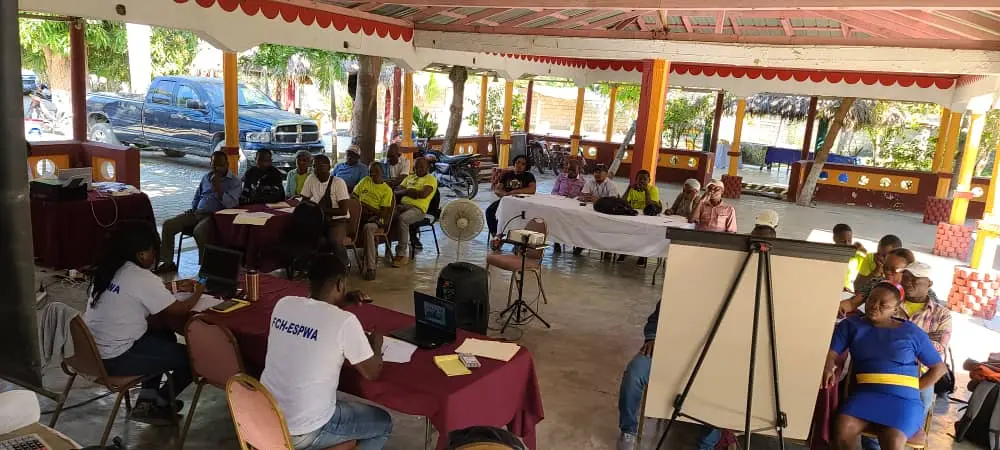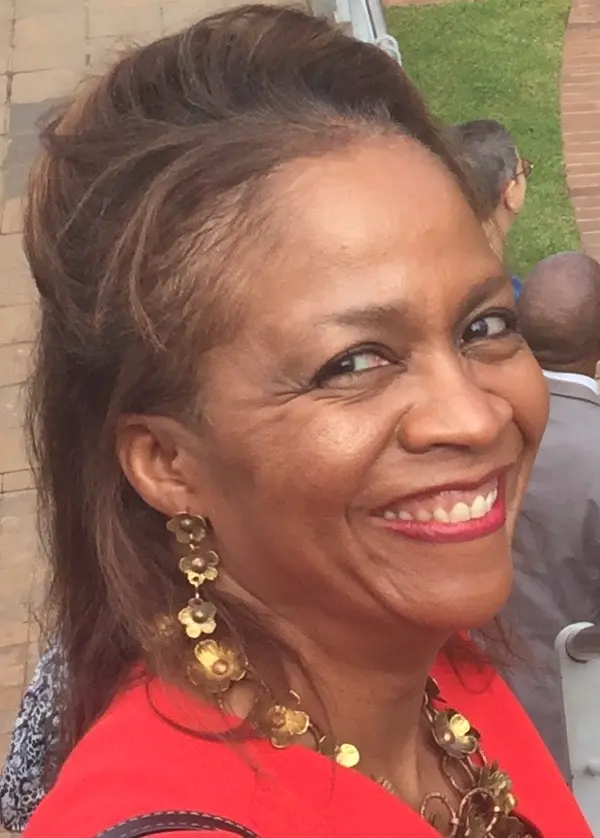In Haitian Creole, “pa ka pa la” means the one that cannot ‘not be there’. Translated into French, it means “incontournable”. In English, an “indispensable person or entity”.
USAID and similar agencies used to be seen as a “Pa ka pa la” before their brutal demise that was akin to an unexpected anaesthesia-free physical amputation. The aid sector lost important limbs, millions bled and died from the resulting wounds, and the collective trauma and deadly blows are still being felt by former staff members/ holders of power, and former ‘community recipients and beneficiaries'.

Haiti Community Foundation's Community Leaders' planning meeting in the Grand Sud of Haiti. Photo Credit FCH-Espwa
A Deeper Malaise
Part of our current malaise in the aid sector is the realisation by many Global North stakeholders that no one is "pa ka pa la”. No one is indispensable. It is a reality that Global South/Global Majority stakeholders have had to learn to live with for decades. Living with insecurity and a constant sense of having no control are integral to the experience of Global South Citizenship. The hurricanes of geopolitical events and the trauma of climatic disasters from wars, coups, tsunamis, earthquakes, and violence have shaped our lives and ensured that we cannot take things for granted. At an early age (if we survive it at all), we fast learn that control is an illusion and that life is not fair. It just is. This is why loyalty and solidarity of family, true friends, and allies are such priceless commodities in our world. We have learnt very quickly that no one can do it alone without forming communities and counting on their support for our survival. Community is essential for survival. An existential truth.
A Faulty Structure
If the aid sector’s dynamics and operational flow had been truly centred on communities, and genuinely making them a “pa ka pa la”, the collapse that we have been witnessing would not have happened. Think about it. If the aid sector had been focused on working with communities on ensuring their self-determination and self-sufficiency, it would have worked on transferring resources to and fostering self-governance in the Global South for decades, as opposed to continuing to sustain its status quo and hegemony. Its efforts were half-hearted at best and never truly put communities in the leadership seat. As such, it reinforced their vulnerability and dependency, as opposed to building their true capacity through strength and ownership. As such, it is just as responsible as the various governments shifting away from global cooperation for the crushing blows and wounds that communities have been experiencing. Just as responsible as the various national Global Majority governments that have allowed such dependencies to occur and take deep, destabilising roots.
Is this an overgeneralisation given the global economic structures that perpetuate rather than eradicate colonialism? Perhaps. It is, however, a fact that we cannot escape and a truth that we, as a sector, must face.
Hope for Our Future
Is there hope for our future? Yes. We must make communities a “pa ka pa la” as they should have always been. What it means is to reinvent a sector that was never meant to end aid into one that can thrive on solidarity. What it means is to have countries and communities coming together with allies and friends to mutually heal their wounds and lead their development.
What is in the way of this new pathway? Fear of the unknown, egos, self-interest, and a deep-seated compulsive need for continuing control. None of us is immune to the gnawing feelings of insecurity that keep us awake at night, for whether we like to admit it or not, we are all part of the “system”. We have choices to make between giving in to our fear or choosing to reconstruct our world with hope and action. Movements and coalitions are forming and working on building better futures, even as others are still paralysed by fear and leaning into submission to fascism for the illusion of protection.
We need to learn from the past to build a stronger future. We failed as a sector, as we failed communities. They are our hearts and our “raison d’être”. Moving forward with an approach that starts and ends with communities is no longer optional. It is the healthy blueprint to rebuild a global web of support and discard what never should have been.
Let’s make communities a “pa ka pa la”, for after all, “se mèm nou mèm nan» as we say in Creole: “We are all part of each other”. It is time that we recognise that we are only strong when we come together with and for communities.
Author

Born and raised in Haiti, Marie-Rose Romain Murphy is a social entrepreneur who has helped to launch several programmes and organizations including ESPWA, Inc. (Economic Stimulus Projects for Work and Action), a Haitian-led organization focusing on the long-term development of Haitian organizations working in Haiti. She’s also the Co-Founder of the Haiti Community Foundation, Haiti’s first community foundation. As the President of RMC- Romain Murphy Consulting, she works as a Partner for Community Change and a strategy and Management Advisor with a wide range of local, national and international organizations. She has more than thirty years of experience and a strong track record in community development, human services, humanitarian projects, philanthropy, marketing, executive leadership.. Her core interest is the creation of viable and sustainable pathways of development for low-income individuals, marginalized communities and Global Majority countries. She provides thought leadership in anti-racism, localization, decolonization, aid restructuring and community-led structural change.
This blog was developed for a forthcoming compendium of stories about the seeds of the future that are already visible, coordinated by CDA Collaborative Learning. Kuja will also have a story published in the compendium. Learn more and access open source case studies about transforming power, practical resources co-developed by CDA and partners around the world, and more reflections by Marie-Rose Romain Murphy.
If you want to tag CDA in any social media: https://www.linkedin.com/company/cda-collaborative-learning-projects https://www.facebook.com/CDACollaborative/ https://www.instagram.com/cda.learning/